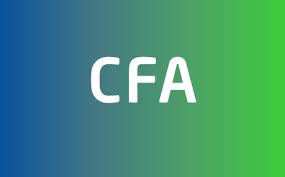How Hard is the CFA? Difficulty, Pass Rates, and Study Tips
How Hard is the CFA? Difficulty, Pass Rates, and Study Tips

Accounting
The Chartered Financial Analyst (CFA) designation is one of the most respected credentials in the finance and investment industries. However, many aspiring finance professionals wonder: how hard is the CFA exam? The short answer is—it’s tough. But how tough exactly? In this article, we’ll explore the structure of the CFA program, the difficulty level of each exam level, pass rates, required skills, study strategies, and whether the journey is worth it in the end.
What is the CFA?
The Chartered Financial Analyst (CFA) designation is a globally recognized professional credential offered by the CFA Institute. It is designed for financial analysts, portfolio managers, investment bankers, and professionals who want to deepen their knowledge in investment management and ethical financial decision-making.
The CFA program consists of three levels—Level I, Level II, and Level III. Each level tests a candidate’s mastery of a wide range of finance-related topics, including:
-
Ethical and professional standards
-
Quantitative methods
-
Economics
-
Financial reporting and analysis
-
Corporate finance
-
Equity investments
-
Fixed income
-
Derivatives
-
Alternative investments
-
Portfolio management and wealth planning
Why is the CFA Considered Hard?
Volume of Material
One of the main reasons the CFA exam is considered difficult is the sheer amount of material that must be studied. Each level requires candidates to master thousands of pages of content across multiple topic areas.
Depth and Complexity
While Level I focuses more on basic knowledge and comprehension, Level II and Level III delve deeply into application, analysis, and portfolio management. The depth of knowledge required increases significantly as candidates move through each level.
Time Commitment
On average, CFA candidates report studying over 300 hours per level. Many juggle this commitment alongside full-time jobs, making time management critical. Preparing adequately requires disciplined, consistent effort over several months.
Exam Format
Each level’s exam format poses its own challenges:
-
Level I consists of multiple-choice questions and tests comprehension and recall.
-
Level II introduces item sets or mini-case studies, demanding deeper analytical skills.
-
Level III includes constructed response (essay-style) questions in addition to item sets, emphasizing portfolio management and practical application.
CFA Exam Pass Rates
Historically, CFA exams have had relatively low pass rates, which is another indicator of the program’s difficulty:
Note: Due to changes during the COVID-19 pandemic and transitions to computer-based testing, some recent pass rates dropped significantly. However, as the process stabilizes, the rates are gradually recovering.
CFA Difficulty by Level
Level I – Foundation, But Not Easy
Level I focuses on basic understanding of financial concepts and tools. While the questions are multiple choice, the challenge lies in the volume of material and breadth of topics. Many underestimate Level I, but the failure rate remains high among unprepared candidates.
Level II – The Application Gauntlet
Level II is widely regarded as the most difficult level. It requires deep analytical thinking and the ability to apply concepts to real-world scenarios. The item set format adds complexity, as a single vignette can inform multiple questions.
Level III – The Synthesis Challenge
Level III focuses on portfolio management and wealth planning. The essay section (constructed response) is particularly challenging due to its open-ended nature. Candidates must articulate their thought process clearly, apply theory to practice, and manage their time effectively during the exam.
Key Skills Required to Pass the CFA
To succeed in the CFA exams, candidates need more than just knowledge. They must develop and refine several core skills:
-
Time Management: Balancing work, study, and personal life is crucial.
-
Analytical Thinking: Especially vital for Levels II and III.
-
Endurance and Discipline: Sustained study over 6–9 months is necessary per level.
-
Problem Solving: Many questions test your ability to think critically and apply concepts.
-
Writing Skills: For Level III, clear and concise written responses are essential.
Study Tips for CFA Candidates
-
Start Early: Begin studying at least 6 months before your exam date.
-
Follow a Structured Plan: Use a calendar to set weekly goals and track your progress.
-
Use CFA Institute Materials: They are the most aligned with the actual exam.
-
Practice, Practice, Practice: Take as many mock exams and practice questions as possible.
-
Focus on Ethics: Ethics is a heavily weighted and sometimes decisive topic at all levels.
-
Join a Study Group or Course: Collaborating with others can enhance understanding and accountability.
Is the CFA Worth the Effort?
While the CFA exam is undeniably challenging, the rewards can be significant. Benefits of earning the CFA charter include:
-
Career advancement in asset management, equity research, or investment banking.
-
Global recognition in the finance industry.
-
Enhanced financial knowledge and decision-making skills.
-
Increased earning potential.
However, it's important to assess whether the CFA aligns with your career goals. For roles that are not directly tied to investment management, other credentials like the CPA, FRM, or MBA may be more suitable.
Real Stories from CFA Candidates
Many candidates describe the CFA journey as one of the most demanding yet rewarding experiences of their careers. Some fail one or more levels before ultimately passing. Others credit the program with transforming their professional outlook and skills. The consensus? It’s hard—but not impossible.
The Future of the CFA: Evolving with the Industry
The CFA Institute continues to evolve its curriculum to reflect industry needs. New topics such as ESG investing, artificial intelligence, data analytics, and decentralized finance are increasingly emphasized. As the finance industry adapts to technological innovation, future CFA exams are likely to incorporate even more cutting-edge content.
So, how hard is the CFA? It’s very hard—but not unachievable. The combination of vast material, complex application, and high standards makes it one of the toughest exams in finance. However, with the right preparation, mindset, and commitment, many candidates succeed and enjoy substantial career rewards.
Whether you're just starting your journey or deciding if the CFA is right for you, remember: it’s a marathon, not a sprint. Prepare wisely, stay disciplined, and keep your long-term goals in focus.
Related Articles
Explore Articles on Finance, Accounting, and Career Growth


